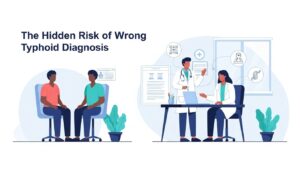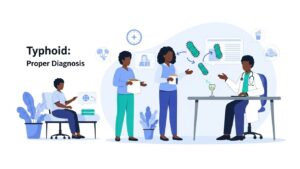What is infertility among women?
The inability to conceive after 12 months of consistent, unprotected sexual activity (or 6 months if you’re over 35) is known as female infertility or causes of female infertility . Numerous reasons, many of which are treatable with the correct care and support, might contribute to it. Understanding the causes of female infertility is essential, as well as recognizing the broader causes of infertility in females and males. More so, the common causes of infertility in females include ovulation disorders, age-related factors, and conditions like endometriosis and PCOS
The Most Common Cause of Infertility In Women
1. polycystic ovary syndrome (PCOS)
Among women of reproductive age, PCOS is one of the main reasons for infertility. It is a hormonal condition that impacts the function of the ovaries.
The Impact of PCOS on Fertility
PCOS-afflicted women may not ovulate (release an egg) every month. However, due to their irregular periods this makes getting pregnant more difficult. Acne, weight gain, and excessive hair growth are further symptoms.
An Example from Real Life
Take Tolu, who struggled with acne and realized her periods were irregular. She discovered how medication and lifestyle modifications could help control her cycle and increase her chances of getting pregnant after receiving a PCOS diagnosis at Well-Life Hospital.
2.Endometriosis Affects Fertility
Certainly, this disorder can cause inflammation, scar tissue, and adhesions that can block the fallopian tubes or interfere with the meeting of egg and sperm.
Actionable Insight: If you have severe menstrual pain or discomfort during sex, don’t ignore it; early diagnosis and treatment can make a big difference.
3.Age and Ovarian Reserve
Age is a major cause of female fertility because women are born with all of their eggs, and over time, both the quantity and quality of their eggs decrease.
Age and Fertility
After the age of 35, fertility begins to diminish more quickly than it did in the late 20s. The likelihood of a natural conception decreases significantly at the age of 40.
Moment of Storytelling
Due to her hectic work schedule, Ada waited until she was in her late 30s to start a family. It was harder for her to get pregnant when she thought she was ready. She investigated possibilities such as assisted reproductive technology and fertility preservation under the supervision of the Well-Life Hospital team.
4.Disorders of Ovulation
Infertility can also result from ovulation problems other than PCOS. These include premature ovarian insufficiency, hyperprolactinemia (high levels of the hormone prolactin), and thyroid abnormalities.
Signs to Look Out for
- Irregular or nonexistent periods;
- unexplained weight changes;
- unusual hair growth or loss;
If your menstrual cycle is unpredictable, it’s worth consulting a specialist.
5.Tubal Blockages and Pelvic Infections
The fallopian tubes play a crucial role in moving the egg from the ovary to the uterus; blockages or damage from infections (such as pelvic inflammatory disease) can hinder this process; preventing tubal damage can be achieved by practicing safe sex and treating infections as soon as possible.
6.Uterine or Cervical Factors
Structural problems like fibroids, polyps, or congenital abnormalities can impede implantation or sperm movement.
For instance
While some women may have pelvic pain or heavy periods, others may not exhibit any symptoms at all. A straightforward hysteroscopy or ultrasonography can assist in the diagnosis of these disorders.
Misconceptions Regarding Infertility in Women
Let’s dispel a few widespread misconceptions:
Myth: Women are disproportionately affected by infertility.
Fact: Approximately half of all cases of infertility are caused by male causes.
Myth: You cannot be infertile if you have regular periods.
Fact: You can still experience additional fertility issues even if you ovulate on a regular basis.
Myth: The primary cause of infertility is stress.
Fact: The majority of infertility is caused by medical issues, although stress can affect your cycle.
What You Can Do: Doable Actions
- Monitor Your Cycle: To keep an eye on ovulation and spot any anomalies, use a period tracker.
- Adopt a Healthy Lifestyle: Steer clear of tobacco and excessive drinking, eat a balanced diet, and exercise frequently.
- Seek Medical Advice Early: See a fertility specialist if you have been trying to conceive for a year (or six months if you are over 35).
- Don’t Ignore Symptoms: A doctor should be consulted if you experience severe discomfort, irregular periods, or unusual bleeding.
How Your Fertility Journey Is Supported by Well-Life Hospital
Our services at Well-Life Hospital include:
- Thorough evaluations of fertility
- Individualized treatment regimens for endometriosis, PCOS, and other disorders
- Surgery with little access for complicated conditions
- Psychological and emotional assistance
Our staff is committed to assisting you in comprehending your choices and making wise choices regarding your reproductive health.
Conclusion
Take the Next Step with Confidence Whether you’re dealing with PCOS, endometriosis, age-related issues, or inexplicable symptoms, you don’t have to face the causes of female infertility alone. The first step to finding solutions is understanding the causes. If you’re ready to explore your options, contact Well-Life Hospital for professional care, caring support, and a customized approach to your fertility journey. Let’s work together to make hope a reality.






